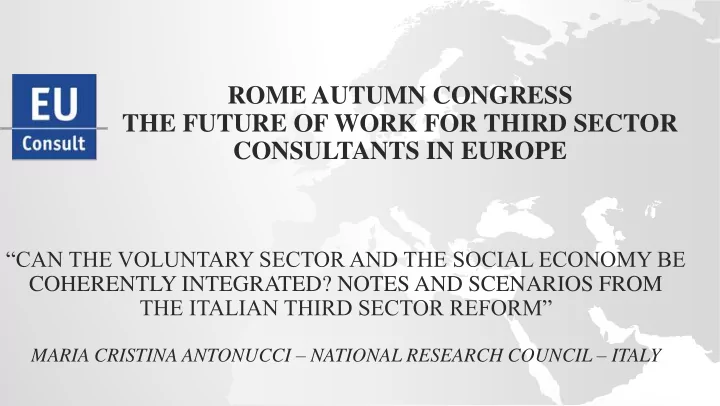

ROME AUTUMN CONGRESS THE FUTURE OF WORK FOR THIRD SECTOR CONSULTANTS IN EUROPE “CAN THE VOLUNTARY SECTOR AND THE SOCIAL ECONOMY BE COHERENTLY INTEGRATED? NOTES AND SCENARIOS FROM THE ITALIAN THIRD SECTOR REFORM” MARIA CRISTINA ANTONUCCI – NATIONAL RESEARCH COUNCIL – ITALY
THE THIRD SECTOR REFORM IN ITALY: THE PROCESS STAKEHOLDERS DELEGATION GENERAL DELEGATED STAKEHOLDERS HEARINGS IN LAW APPROVED REFORM LAW DECREES CONSULTATION IN PARLIAMENT ANNOUNCED APPROVED IN (LAW 2014 IN 2014 2017 2014- 2015 106/2016) Still missing: 42 administrative implementation acts to be released by 2019
THE THIRD SECTOR REFORM IN ITALY: THE MAIN CONTENTS FIRST COMMON REFORM FOR THE WHOLE «THIRD SECTOR»: VOLUNTARY 1. SECTOR + SOCIAL ENTERPRISES NOW SHARE A COMMON REGULATORY FRAMEWORK WITH SPECIFIC FEATURES. CODE FOR THIRD SECTOR ORGANIZATIONS (THE COMPLETE CODE OF 2. REGULATION OF EVERY THE ASPECTS OF THIRD SECTOR ORGANIZATIONS). INSTITUTIONALIZATION OF THE 5 PER THOUSAND ALLOCATION OF INCOME 3. TAX TO SUBSIDIAZE THIRD SECTOR ORGANIZATIONS. CREATION OF NEW PUBLIC/PRIVATE ENTITIES FOR THE THIRD SECTOR 4. GOVERNANCE (NATIONAL COUNCIL FOR THE THIRD SECTOR) AND FOR FUNDRAISING (SOCIAL ITALY FOUNDATION). FUNDING AND FUNDRAISING. 5. NEW TRANSPARENCY AND CONTROLS REGIMES. 6.
DEFINITION OF THIRD SECTOR Third sector is defined as: "the complex of private entities constituted for the pursuit of non- profit, civic, solidarity and social utility purposes and which, in pursuance of the principle of subsidiarity and in accordance with their respective statutes or constitutive acts, promote and carry out activities of general interest by means of voluntary and free forms of action, mutuality or production/exchange of goods or services” .
DEFINITION OF THIRD SECTOR ORGANIZATIONS 1. Volunteer organizations 2. Social promotion associations 3. Philanthropic organizations 4. Social enterprises, including social cooperatives 5. Associative networks 6. Mutual aid companies 7. Foundations and other private entities constituted for the pursuit of non- profit, civic, solidarity and social utility aims
THE THIRD SECTOR ORGANIZATIONS CODE (DECREE N. 117/2017): MAIN PROVISIONS • Compulsory subscription of every organization to the National Register of Third Sector Organizations in order to have juridical recognition and receive funding and tax benefits. The Register will be kept (and checked) by the Italian Ministery of Welfare. • Modification to organizations’ statutes: full transparence on organizations goals, governance model, budgets. • Accounting and tax exemption . New, simplified accounting system regime reserved to third sector non-commercial entities; new rules of transparency for the financial budgets and provision of social budget for all the organizations. • Access to different fundraising (from the private sector) and funding (from the public sector) opportunities for volunteer organizations, social enterprises, social promotion associations, community/participation foundations. • New work regimes and salary ceilings for workers in social enterprises. Different rules for volunteers’ refunding.
NEW ORGANIZATIONS AND FORUM FOR THE THIRD SECTOR GOVERNANCE National Control organ National council for the third sector • 26 members (+ 3) • Public/private • 7 members Social Italy Foundation • 3 years mandate. foundation. Tasks: • 3 years mandate • financial resources • Representative body of • Checks on funds attraction from private the third sector supplied for third subjects organizations sector special projects • microdonations from • advisory function for and network multiple donors policy making. organizations • savings management • Involvement in company investing in monitoring and control social enterprises with functions on the third very low returns sector organizations
NEW TAX REGIMES FOR THIRD SECTOR ORGANIZATIONS Third Sector Organizations assume the status of non-commercial entities when 1. non-profit activities prevail over the commercial one. In this case, profits are taxed by benefiting from an optional flat rate system. For voluntary organizations and social promotion associations with revenues 2. >130k euros, there is a special reduced profitability coefficients tax regime (1 or 3%) without obligation for the entity to issue invoice and without VAT deduction on purchases. Tax provisions, such as exemptions from tax on successions, donations, 3. registrations, mortgages in the case of the transfer of assets are destined to carry out activities of general interest. Tax exemption or reduction on real estate for organization with the exclusive purpose of carrying out or financing non-commercial activities. From 30% to 35 % tax deduction for liberal allowances in favor of entities in 4. the third sector from 1 January 2018. 'solidarity bonds ' and social landing platforms in 2018. 5.
NEW TOOLS AND PRACTICES FOR THIRD SECTOR ORGANIZATIONS Budgetary transparency (with general public on website, and with the organ of control) Measurement of social Mixed public/third impact of the action of sector organization third sector system of checks. organizations. New formats for fundraising New social finance (testamentary leavers, tools microdonations and crowdfunding )
SCENARIOS AFTER THE THIRD SECTOR REFORM General scenario in 4 points: • Integration of the third sectors organization within the legal and fiscal regime released by the reform. • Legal and fiscal simplification for (big and national) social economy organizations (social enterprise, social cooperatives) vs. bureaucratic burden for voluntary sector and social promotion (small and local) organizations . • Systematic public/private control system and transparency rules for all the organizations. • Outputs from new external tools (social impact, fundraising) , proposed by legislator and policy makers, for the future development of the sector
MAIN CONSEQUENCES FOR CONSULTANTS OF THE THIRD SECTOR New consulting areas (social impact measurement, transparency policies, new 1. social investment tools, targeted fundraising). Construction of targeted consultancy paths based on the size, the nature, the 2. objectives and characteristics of the different third sector organizations (ability to offer even more tailored advice ). Cross-sectoral advice on access to funds, tax exemptions, construction of 3. resilient and structured fundraising processes. Practices of advocacy (dialogue, representation and negotiation) with the new 4. bodies and forums (National Third Sector Council, Organ of Control, Social Italy Foundation) posed by the reform. Pathways for integration of organizations and activities to co-managed social 5. innovation .
For any question, please write an email. mariacristina.antonucci@cnr.it
Recommend
More recommend